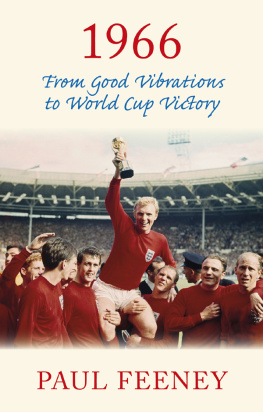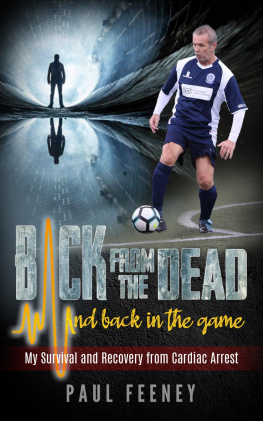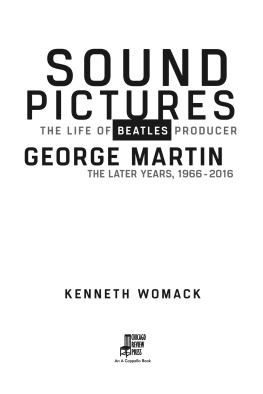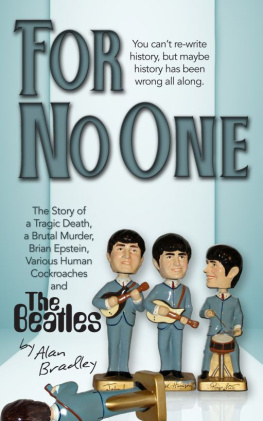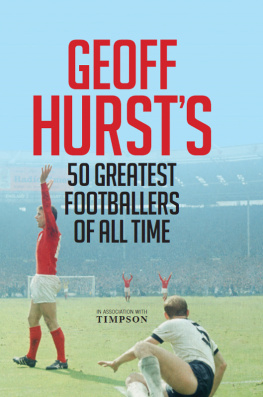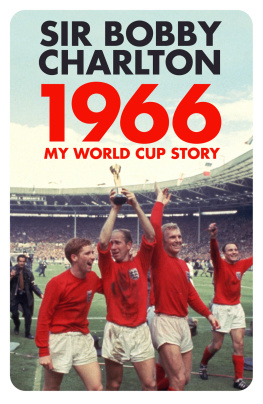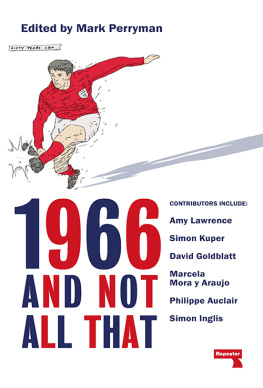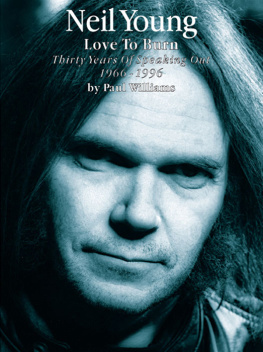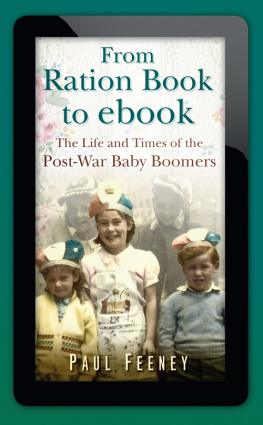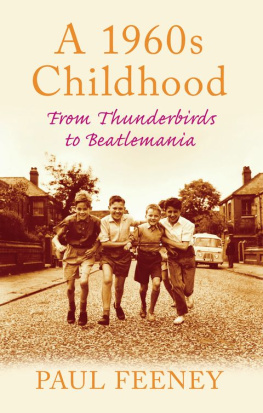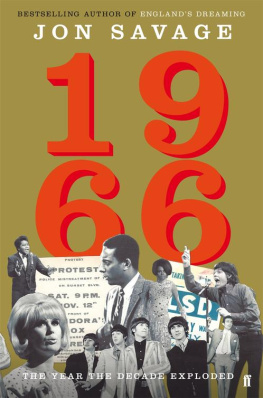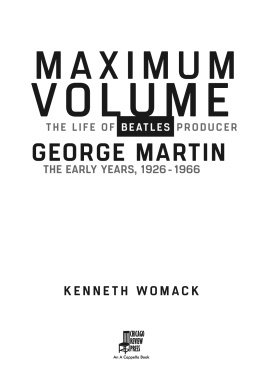1966
1966
From Good Vibrations to World Cup Victory
PAUL FEENEY

First published 2016
The History Press
The Mill, Brimscombe Port
Stroud, Gloucestershire, GL5 2QG
www.thehistorypress.co.uk
Paul Feeney, 2016
This ebook edition first published in 2016
The right of Paul Feeney to be identified as the Author of this work has been asserted in accordance with the Copyright, Designs and Patents Act 1988.
All rights reserved. This ebook is copyright material and must not be copied, reproduced, transferred, distributed, leased, licensed or publicly performed or used in any way except as specifically permitted in writing by the publishers, as allowed under the terms and conditions under which it was purchased or as strictly permitted by applicable copyright law. Any unauthorised distribution or use of this text may be a direct infringement of the authors and publishers rights, and those responsible may be liable in law accordingly.
British Library Cataloguing in Publication Data.
A catalogue record for this book is available from the British Library.
EPUB ISBN 978-0-7509-6913-0
Original typesetting by The History Press
eBook converted by Geethik Technologies
Inflation calculations correct at time of going to press.
CONTENTS
Picture Credits
are courtesy PA Images
(Mark and Colleen Haywood, Getty Images)
(Chris Walter, Getty Images)
(John Downing, Getty Images)
(Ivan Keeman, Getty Images)
(Keystone-France, Getty Images)
(Mark and Colleen Haywood, Getty Images)
(Getty Images)
(Central Press, Getty Images)
(Movie Poster Image Art, Getty Images)
are courtesy Mary Evans Picture Library
are courtesy Science and Society Picture Library
are courtesy Shutterstock
Image on copyright Paul Feeney
ACKNOWLEDGEMENTS
I would like to thank my publisher, Sophie Bradshaw, for giving me the opportunity to develop her initial idea into a book. I remember 1966 so well from my teenage years and I have greatly enjoyed recounting the events of that year while writing this book. My thanks also go to Sophie for sourcing the wonderful pictures that enhance my descriptions of events and help capture the mood of this special year. I would also like to thank Jessica Cuthbert-Smith for her work in managing the copyediting, proofreading, and typesetting for the book so diligently and with such professionalism.
Paul Feeney
One
DAILY LIFE

Ask anyone who was around in Britain in 1966 to recount their memories of that specific year and the chances are that most will remember the fact that it was the year England won footballs World Cup. Some will recall it more enthusiastically than others, depending on their nationality and where their football loyalties lay at the time. Many English people will have their own enduring memories of that event, most especially Englands huge army of football fans. But for every ardent supporter of Englands national football team who cherishes the event with pride, there are still more who are only able to recall it because of the regular reminders they get from the media. There is no doubt that the importance of Englands 1966 World Cup victory has grown with the passage of time. It was the first time England had won the tournament since it began in 1930; therefore, it was a historic occasion and a truly great achievement, but the fact that fifty years have now passed without another win serves to concentrate our minds on just how difficult it is to win footballs World Cup and what an enormous triumph it was for the team of 1966.
Englands football fans of today dream of the day when their team will once again lift that most sought-after trophy. In the meantime, Englands 1966 World Cup champions will continue to be admired and celebrated with pride. I will take a more detailed look at the 1966 World Cup later, but contrary to what many people who were not around in the 1960s might think the World Cup was not the only noteworthy thing to happen in Britain in 1966. We didnt spend the whole year in a state of football frenzy, half the year dreaming of winning the World Cup and the other half celebrating Englands win. In 1966, we were smack-bang in the middle of the Swinging Sixties, and there was a great deal going on at the time, especially in Britains larger towns and cities, particularly in London. This was the year in which Time magazine coined the term Swinging London, and it wasnt because London was hosting the World Cup Final that year. It was because London was the place everyone wanted to be: the popular music and fashion capital of the world. London was at the centre of a cultural revolution; it was where everything fun, colourful and exciting was happening. Britains young people were distancing themselves from the post-war austerity of the 1950s and changing the face of Britain forever.
Its quite understandable that people looking back at the 1960s have difficulty pinning certain events to specific years because over the course of time the whole of the decade has become lumped together and referred to in the media as the 1960s or the Swinging Sixties. But in reality, the austere 1950s were slow to end, and many aspects of the 1950s lifestyle continued well into the 1960s. Indeed people question whether the Swinging Sixties ever happened in some parts of Britain; some suffered poor living conditions throughout the 1960s, living modest lives in damp cold rooms with no hot running water. In 1966, approximately 20 per cent of all households in Britain were without an inside toilet; they were using outside lavatories often housed in ramshackle lean-tos, sometimes shared with neighbours. Its a common failing for us to review bygone decades as a whole rather than in sections or by year, which is not really appropriate because ten years is a long period of time and many changes take place in each decade. As a result, many of todays generation dont realise that the phenomenon now known to us all as the Swinging Sixties didnt poke its head over the parapet until well into 1963, and that was in London. The associated excitement then spread slowly around the country, but some outlying areas never even noticed.
Even those of us who lived through the whole of the 1960s tend to forget the detail and the importance of 1966, but the years historical significance goes way beyond England winning the World Cup. For example, how many people remember that until 29 June 1966, when Barclaycard, the UKs first credit card, was launched, we were still paying for everything using cash or cheque? For many, cash was the only means of paying because there were still large numbers of workers whose wages were paid in cash, so they didnt need to have a cheque book or bank account.
Often, a simple reminder will trigger someone to recall great volumes of information about events that took place many decades ago. Like so many of my generation, sometimes I need prompting before I can remember the exact year in which a specific event took place. However, I have vivid memories of 1966 because I had only recently left school and started work, so it represents an important timeline in my life. I can remember a fair amount without research, and two things remain uppermost in my memory of that year. First, the most important and saddest event that year, which left its mark on me and no doubt on millions of others around the world, was the disaster in Aberfan, South Wales. On 21 October a giant coal waste tip suddenly collapsed and slid downhill, covering the villages primary school and killing 116 children and 28 adults. It was a terrible tragedy that is surely remembered by everyone who saw this headline story dominating news broadcasts for weeks after the event. The other event I vividly remember was not a tragic one but it did cause some financial difficulties for the nations workforce, including myself. It was when the Wilson government imposed a six-month wage and price freeze, starting on 20 July that year. I remember taking it very personally at the time because it coincided with my first-ever pay rise, which had to be postponed. It was a bit of a shock for a new young worker quite demotivating. Oh, yes, there was one other thing that I remember very well, probably more so because I was new to wage earning: it was the price of a pint of beer, which was 1
Next page
